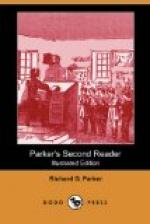4. These are called rhymes. Here are a few such lines.
IMPROVEMENT OF TIME.
“Defer not till to-morrow
to be wise;
To-morrow’s sun
to thee may never rise.”
BEST USE OF MONEY.
“When wealth to virtuous
hands is given,
It blesses like the
dew of Heaven;
Like Heaven, it hears
the orphan’s cries,
And wipes the tears
from widow’s eyes.”
5. Sometimes the rhymes occur in alternate lines; that is, two lines come together which are not rhymes, and are followed by two lines to make rhymes to both, as follows:
“Let the sweet work
of prayer and praise
Employ our
youngest breath;
Thus we’re prepared
for longer days,
Or fit for
early death.”
6. There are some kinds of verses that do not rhyme. These are called blank verse. Here is an example of blank verse:
“Mark
well, my child, he said; this little stream
Shall teach thee charity.
It is a source
I never knew to fail:
directed thus
Be that soft stream, the fountain
of thy heart.
For, oh! my much-loved child,
I trust thy heart
Has those affections that
shall bless thyself;
And, flowing softly like this
little rill,
Cheer all that droop.
The good man did not err.”
7. Now, there are several things that I wish you to notice in these lines. In the first place, if you will count the syllables, you will find that there are exactly ten syllables in each line; and it is always the case, that in verse it is necessary that there should be a certain number of syllables of a certain kind.
8. What that number is, I cannot now explain to you; but you will be able to understand from a book called a grammar, which you will probably study at some future time, if you do not study it now. It is contained in that part of grammar called Prosody.
9. The next thing I wish you to notice is, that every line of verse always begins with a capital letter.
10. And thirdly you will notice, that the lines of verse are more regular in their sound than lines of prose. They have a kind of musical sound about them, which you very rarely hear, except in verse.
11. And fourthly you will notice, that some of the words are shortened by leaving out a letter, and putting in its place a mark called an apostrophe, which looks just like a comma, only it is placed higher up in the line, as in the following line:
“Thus we’re prepared for longer days.”
12. In this line, if the words were written out at full length, with all their letters in them, the line would stand as follows:
“Thus we are prepared for longer days.”
13. But this would destroy what is called the measure of the line, by putting too many syllables into it; and therefore the words we are are shortened, so as to be read as one syllable, and the line is to be read as follows:




